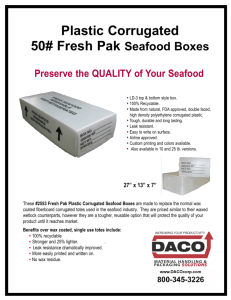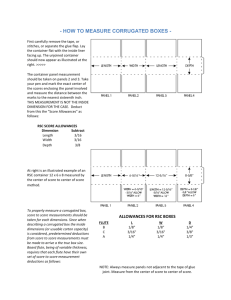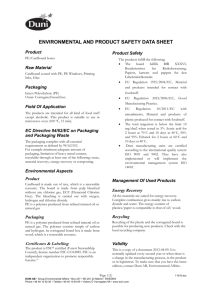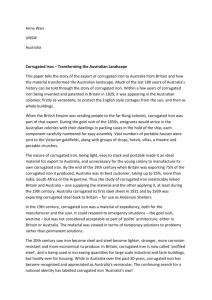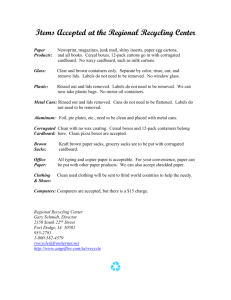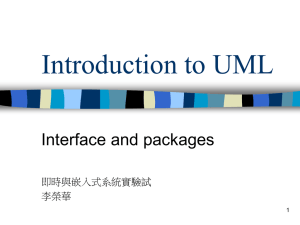Pre-Feasibility Study
advertisement
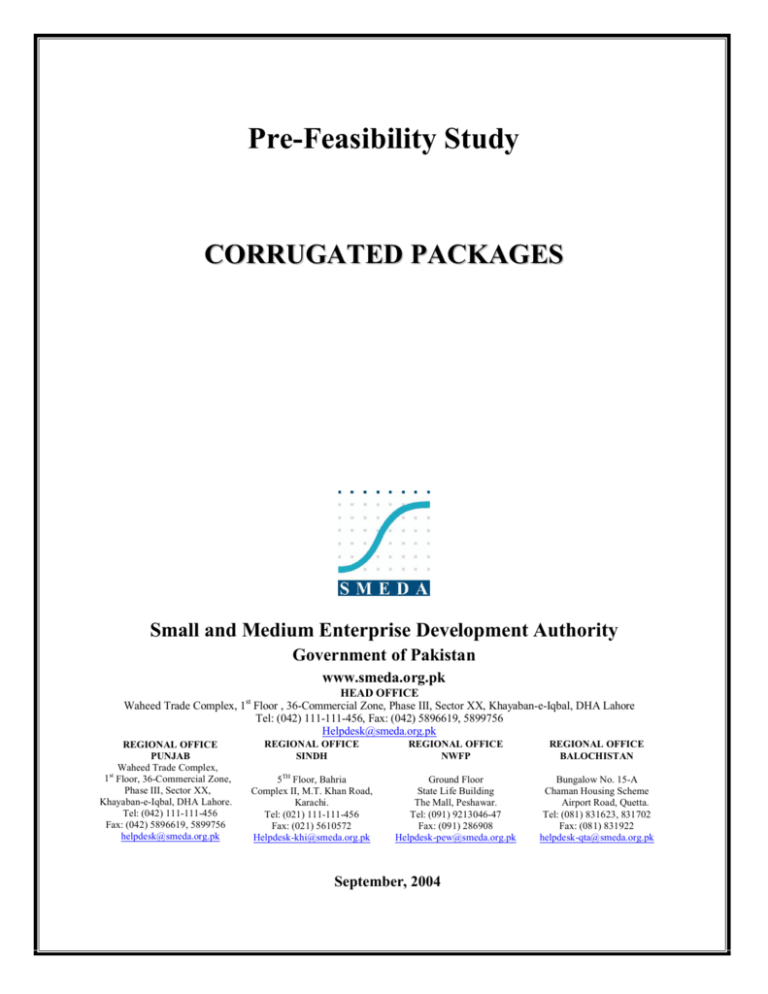
Pre-Feasibility Study CORRUGATED PACKAGES Small and Medium Enterprise Development Authority Government of Pakistan www.smeda.org.pk HEAD OFFICE Waheed Trade Complex, 1st Floor , 36-Commercial Zone, Phase III, Sector XX, Khayaban-e-Iqbal, DHA Lahore Tel: (042) 111-111-456, Fax: (042) 5896619, 5899756 Helpdesk@smeda.org.pk REGIONAL OFFICE PUNJAB Waheed Trade Complex, st 1 Floor, 36-Commercial Zone, Phase III, Sector XX, Khayaban-e-Iqbal, DHA Lahore. Tel: (042) 111-111-456 Fax: (042) 5896619, 5899756 helpdesk@smeda.org.pk REGIONAL OFFICE SINDH REGIONAL OFFICE NWFP REGIONAL OFFICE BALOCHISTAN 5TH Floor, Bahria Complex II, M.T. Khan Road, Karachi. Tel: (021) 111-111-456 Fax: (021) 5610572 Helpdesk-khi@smeda.org.pk Ground Floor State Life Building The Mall, Peshawar. Tel: (091) 9213046-47 Fax: (091) 286908 Helpdesk-pew@smeda.org.pk Bungalow No. 15-A Chaman Housing Scheme Airport Road, Quetta. Tel: (081) 831623, 831702 Fax: (081) 831922 helpdesk-qta@smeda.org.pk September, 2004 Pre-feasibility Study Corrugated Packages 1 INTRODUCTION TO SMEDA.................................................................................................... 5 2 PURPOSE OF THE DOCUMENT ............................................................................................... 5 3 CRUCIAL FACTORS & STEPS IN DECISION MAKING FOR INVESTMENT..................... 6 3.1 3.2 3.3 3.4 4 PROJECT PROFILE.................................................................................................................... 6 4.1 4.2 4.3 4.4 4.5 4.6 4.7 5 PRIMARY FUNCTIONS ............................................................................................................ 10 Protective Function.......................................................................................................... 10 Loading and Transport Function...................................................................................... 10 SECONDARY FUNCTIONS ....................................................................................................... 10 Sales Function ................................................................................................................. 10 Promotional Function...................................................................................................... 10 SERVICE FUNCTION ............................................................................................................... 10 PRODUCTION PROCESS FLOW ................................................................................................ 10 PRODUCT MIX ...................................................................................................................... 12 RAW MATERIAL REQUIREMENT ............................................................................................. 12 Take Up Factor (Liner Paper).......................................................................................... 13 Waste Margin .................................................................................................................. 14 Major Suppliers of Raw Material ..................................................................................... 14 SALES PRICE ......................................................................................................................... 14 TECHNOLOGY AND PROCESSES.......................................................................................... 14 8.1 8.2 8.3 8.4 8.5 8.6 9 MARKET POTENTIAL ............................................................................................................... 9 TARGET CUSTOMERS .............................................................................................................. 9 PRODUCT................................................................................................................................... 10 7.1 7.1.1 7.1.2 7.2 7.2.1 7.2.2 7.3 7.4 7.5 7.6 7.6.1 7.6.2 7.6.3 7.7 8 SECTOR CHARACTERISTICS ..................................................................................................... 8 MARKET INFORMATION ......................................................................................................... 9 6.1 6.2 7 OPPORTUNITY RATIONALE ...................................................................................................... 6 PROJECT BRIEF ....................................................................................................................... 7 MARKET ENTRY TIMING ......................................................................................................... 7 PROJECT CAPACITY AND RATIONALE ....................................................................................... 7 PROJECT INVESTMENT ............................................................................................................. 8 RECOMMENDED PROJECT PARAMETERS ................................................................................... 8 PROPOSED LOCATION .............................................................................................................. 8 SECTOR & INDUSTRY ANALYSIS........................................................................................... 8 5.1 6 STRENGTHS ............................................................................................................................ 6 WEAKNESSES.......................................................................................................................... 6 OPPORTUNITIES ...................................................................................................................... 6 THREATS ................................................................................................................................ 6 MACHINERY & EQUIPMENT REQUIREMENT ............................................................................ 15 REPAIR & MAINTENANCE ...................................................................................................... 16 ERECTION & INSTALLATION .................................................................................................. 16 OFFICE EQUIPMENT ............................................................................................................... 16 FURNITURE AND FIXTURES .................................................................................................... 17 MOTOR VEHICLES ................................................................................................................. 17 LAND & BUILDING REQUIREMENT .................................................................................... 17 9.1 9.2 COVERED AREA REQUIREMENT ............................................................................................. 17 RENT COST ........................................................................................................................... 17 2 PREF-79 /Sep, 2004/Rev 1 Pre-feasibility Study 9.3 Corrugated Packages UTILITIES REQUIREMENT ...................................................................................................... 18 10 HUMAN RESOURCE REQUIREMENT................................................................................... 18 11 PROJECT COSTS ...................................................................................................................... 18 11.1 12 FINANCIAL ANALYSIS............................................................................................................ 20 12.1 12.2 12.3 12.4 12.5 13 ESTIMATED TIME FOR PROJECT COMPLETION .......................................................................... 19 PROJECT COSTS .................................................................................................................... 20 PROJECTED INCOME STATEMENT ........................................................................................... 21 PROJECTED BALANCE SHEET ................................................................................................. 22 PROJECTED CASH FLOW STATEMENT ..................................................................................... 23 RAW MATERIAL COSTS ......................................................................................................... 24 KEY ASSUMPTIONS................................................................................................................. 25 3 PREF-79 /Sep, 2004/Rev 1 Pre-feasibility Study Corrugated Packages DISCLAIMER The purpose and scope of this information memorandum is to introduce the subject matter and provide a general idea and information on the said area. All the material included in this document is based on data/information gathered from various sources and is based on certain assumptions. Although, due care and diligence has been taken to compile this document, the contained information may vary due to any change in any of the concerned factors, and the actual results may differ substantially from the presented information. SMEDA does not assume any liability for any financial or other loss resulting from this memorandum in consequence of undertaking this activity. The prospective user of this memorandum is encouraged to carry out additional diligence and gather any information he/she feels necessary for making an informed decision. For more information on services offered by SMEDA, please contact our website: www.smeda.org.pk DOCUMENT CONTROL Document No. PREF-79 Prepared by SMEDA-Punjab Approved by Provincial Chief Punjab Issue Date September, 2004 Issued by Library Officer 4 PREF-79 /Sep, 2004/Rev 1 Pre-feasibility Study 1 Corrugated Packages INTRODUCTION TO SMEDA Small and Medium Enterprise Development Authority (SMEDA) was established with the objective to provide fresh impetus to the economy through the launch of an aggressive SME support program. Since its inception in October 1998, SMEDA had adopted a sectoral SME development approach. A few priority sectors were selected on the criterion of SME presence. In depth research was conducted and comprehensive development plans were formulated after identification of impediments and retardants. The all-encompassing sectoral development strategy involved recommending changes in the regulatory environment by taking into consideration other important aspects including finance, marketing, technology and human resource development. SMEDA has so far successfully formulated strategies for sectors including, fruits and vegetables, marble and granite, gems and jewelry, marine fisheries, leather and footwear, textiles, surgical instruments, transport and dairy. Whereas the task of SME development at a broader scale still requires more coverage and enhanced reach in terms of SMEDA’s areas of operation. Along with the sectoral focus a broad spectrum of business development services is also offered to the SMEs by SMEDA. These services include identification of viable business opportunities for potential SME investors. In order to facilitate these investors, SMEDA provides business guidance through its help desk services as well as development of project specific documents. These documents consist of information required to make well-researched investment decisions. Pre-feasibility studies and business plan development are some of the services provided to enhance the capacity of individual SMEs to exploit viable business opportunities in a better way. This document is in the continuation of this effort to enable potential investors to make well-informed investment decisions. 2 PURPOSE OF THE DOCUMENT The objective of a pre-feasibility study is primarily to facilitate potential entrepreneurs in project identification for investment. The project pre-feasibility may form the basis of an important investment decision and in order to serve this objective, the document/study covers various aspects of project concept development, start-up, production, marketing, finance and business management. The document also provides sectoral information, brief on government policies and international scenario, which have some bearing on the project itself. This particular pre-feasibility relates to Corrugated Packages. Before studying the whole document one must consider following critical aspects, which form the basis of any investment decision. 5 PREF-79 /Sep, 2004/Rev 1 Pre-feasibility Study 3 Corrugated Packages CRUCIAL FACTORS & STEPS IN DECISION MAKING FOR INVESTMENT Before making the decision, whether to invest in the corrugated packaging business or not, one should carefully analyze the associated risk factors. A SWOT analysis can help in analyzing these factors which can play important role in making the decision. 3.1 Strengths 3.2 Weaknesses 3.3 3.4 Corrugated packages allow for easy printing of labels and can be manufactured to a wide range of sizes, shapes and strength specifications. Manufacturing sector of Pakistan showed a record growth of 13.4% in the year 2003-2004, which in turn increases the demand for packaging facilities as well. Threats 4.1 Corrugated packages are not reusable. They cannot be produced economically on a small scale. Cost of labour for each batch and cost of overheads keep on decreasing with the increasing production. They are easily damaged by water and rough handling unless impregnated with wax at extra cost. They offer most practical and economic choice for packaging but availability of suitable designs at the right price remains the greatest challenge to improvements. Opportunities 4 Corrugated packages provide efficient and convenient unit for marketing of the product. They allow weighing of produce as well as handling and transport to be accomplished in fewer steps. When compared with wooden crates, corrugated boxes are light to carry and are preferred by air freight companies. They are recyclable unlike non-recyclable packaging that has to be burnt at the end of its life. Innovations in the packing industry like plastic crates, plastic bags etc. may affect the market demand for corrugated packages. PROJECT PROFILE Opportunity Rationale Corrugated Packaging is visible wherever goods are produced, transported and displayed. Since its invention years ago, corrugated packaging has ensured efficient safe and sanitary transit of goods, protecting and wrapping about 70% of the world’s liquid and solid materials from producer to consumer. 6 PREF-79 /Sep, 2004/Rev 1 Pre-feasibility Study Corrugated Packages In Pakistan, the demand for corrugated packages is increasing, as the growth in the manufacturing industry touched a level of 13.4%1 last year Corrugated packaging protects the product during storage, transportation and handling. Thus the package, by virtue of its protective function-becomes a vital link in the distribution chain. Also corrugated cartons offer the most practical and economic choice for packaging for inter island trade. Product range includes consumer packages, food and non food-packages, transport packages. 4.2 Project Brief The proposed project will be producing corrugated packages. Corrugated packages are paperboard made from one or more plies of fluted paper, which is glued onto, paper or cardboard. The said business will be producing 7-ply corrugated sheets. Different sizes of boxes will be produced to facilitate the customers nationwide. The proposed business will be manufacturing corrugated boxes for meeting the local demand. 4.3 Market Entry Timing Corrugated Packages are used in so many different sectors that the demand never gets affected with seasons, changing trends and emerging attributes. So the proposed business can be started at any time of the year. At the commencement of the proposed business, it is important that the entrepreneur must have good public relations in the market and should have some orders in hand. 4.4 Project Capacity and Rationale The proposed corrugated packaging facility will handle 3000 boxes per day in 8 hours shift. Details are given in the following table. Table 4-1 Project Capacity Hours utilized by one batch Number of product lines Maximum box capacity per day per shift 2 4 3,000 The industry norm is to run the unit for one shift per 8 hours. However, it can vary depending on the level of orders received from the market. This feasibility is based on one shift of 8 hours. 1 Economic Survey Of Pakistan 2003-2004 7 PREF-79 /Sep, 2004/Rev 1 Pre-feasibility Study 4.5 Corrugated Packages Project Investment Total project cost is Rs. 5.37 million. 4.6 Recommended Project Parameters Capacity 3,000 boxes Human Resource Technology/Machinery Location 28 Local Lahore Financial Summary Project Cost IRR NPV (Rs.) Payback Period Rs. 5.37 million 42% Rs. 8.80 million 4 Yrs. Total cost of the project is worked out in the table below: Table 4-1 Project Costs Capital Investment Working Capital Requirement Total Investment 4.7 4,311,000 1,056,000 5,367,000 Proposed Location Selection of a district or a particular city for a project has an imperial effect on fixed and operational costs. The proposed location should be located near the industrial areas as this would reduce the transport cost. Suitable locations in Pakistan for setting up the proposed business are mentioned in the table below: Table 4-2 Suitable Locations City Lahore Rawalpindi Karachi Faisalabad 5 5.1 Location Kot Lakhpat, Bund Road, Multan Road, Sheikhupura Road, Kasur Road,Raiwand Road Peshawar Road, Peer wadhai Korangi Industrial Area, Landhi Industrial Area Sargodha Road, Jharanwala Road SECTOR & INDUSTRY ANALYSIS Sector Characteristics The numbers of corrugated packaging facilities in Pakistan has increased at a rapid pace over the last few years. The size of this sector is still growing. Large corrugated packaging facilities have been set up in the industrial areas of Pakistan. Approximately 2,000 corrugated packaging facilities are being operated in Lahore. Few of them are as follows: Fine Packages Packages Limited 8 PREF-79 /Sep, 2004/Rev 1 Pre-feasibility Study Corrugated Packages Roshan Packages Al-sheikh Packages Convertec Packages Bismillah Packages General Packages Similarly, large corrugated packaging facilities are also working in prime business locations in Karachi and Rawalpindi. MARKET INFORMATION 6 6.1 Market Potential The trend for packaging has changed from the primitive packaging (wooden boxes) to a modern and up-to-date packaging (corrugated packaging). Nowadays, corrugated packaging is used by almost every manufacturer and supplier or perishable, non perishable and fragile products. Corrugated Packages have inherent benefits as they are environment friendly and have recycling capability. This is the major reason, the international market prefers corrugated packages. Table 6-1 Global Trade of Corrugated Packages2 Year 1998 1999 2000 2001 2002 US $ (000) 2,685,150 2,694,482 2,899,206 2,739,371 2,869,572 Pakistan’s share in the global trade is not very high but Pakistan has been exporting corrugated Packages to UAE and Somalia in the year 2000 and 2001. 6.2 Target Customers As mentioned above, the target customers are manufacturers and suppliers of all types of goods. Following are some of the target clients for a manufacturer of corrugated packaging. 2 Pharmaceutical Industry Textile Industry Home Appliances Garments Dairy Products Fruits and Vegetables and Shoes Trade Analysis System 2001-2002 9 PREF-79 /Sep, 2004/Rev 1 Pre-feasibility Study 7 Corrugated Packages PRODUCT The proposed project will be producing 7 ply corrugated packaging boxes of different sizes which will be serving several purposes. The functions of the product can be classified into three different categories. 7.1 Primary Functions 7.1.1 Protective Function The protective function of packaging essentially involves protecting the contents from the environment and vice versa. This is intended to ensure full retention of the utility value of the packaged goods or in other words it is intended to protect the goods from loss, damage and theft. 7.1.2 Loading and Transport Function Convenient goods handling entails designing transport packaging in such a manner that it may be held, lifted, moved, set down and stowed easily, efficiently and safely. Packaging thus has a crucial impact on the efficiency of transport, handling and storage of goods. 7.2 Secondary Functions 7.2.1 Sales Function The purpose of the sales function of a package is to enable or promote the sales process and to make it more efficient 7.2.2 Promotional Function Promotional material placed on the packaging is intended to attract the potential purchaser and to have a positive impact upon the purchasing decision. 7.3 Service Function The various items of information printed on packaging provide the consumer with details about the contents and use of the particular product i.e. dosage information on medicines. 7.4 Production Process Flow A 7 ply corrugated box consists of 7 layers of sheets. 2 sheets of kraft paper are used on both sides and 5 sheets of flutter paper are used in between them. 3 three sheets of flutter paper will be lined and 2 sheets will be of plain flutter paper. A 7 ply sheet is shown in the figure below: 10 PREF-79 /Sep, 2004/Rev 1 Pre-feasibility Study Figure 7-1 Corrugated Packages 7 Ply corrugated sheet Kraft Paper Flutter paper (plain) Kraft Paper Flutter Paper (lined) The process of manufacturing starts from corrugating followed by cutting in accordance with different shapes and sizes, pasting, rotary, bending according to the design and finally stapling to form a shape and to remain strongly intact. Figure 7-2 Process Flow Corrugating Cutting Slanting/ bending Rotary Pasting Printing Stapling The above process takes approximately 8 hours to complete from corrugation to stapling. Each process is explained as below: a) Corrugation: - In this process the flutter paper is firstly heated up, then passed over the tray, which contains pasting fluid, along with the kraft paper. It is then passed through a corrugating machine, where 5-ply paper corrugated board is manufactured by using glue making unit and reel stand. b) The Liner paper can also be used instead of Flutter paper for better quality upon clients’ special request. c) Cutting: - The sheet is cut according to the required size using a paper cutter. d) Pasting: - The corrugated sheet is then pasted on to another set of corrugated sheet, making it 7 Ply. 11 PREF-79 /Sep, 2004/Rev 1 Pre-feasibility Study Corrugated Packages e) Printing: - It is then printed as required by the customers i.e. fragile, some object, recycle after use etc. f) Rotary: - In this process the flaps and the Four Corners of the box are made using rotary machine. g) Slanting: - The sheet is bent in this process, forming a box shape. h) Stapling – To give the box a firm and a proper shape, they are finally stapled. 7.5 Product Mix Different sizes of boxes are produced for various target industries. They are as follows: Table 7-1 Sizes A B C D Product Range Measurements 24” x 24” x 8” 14.54” x 10.5” x 6.25” 19.69”x17.72”x13.78” (50cm x 45cm x 35cm) Others Target Industry Textile Sector Pharmaceutical Sector Multi purpose Fridge, Electronic products etc. Production capacity varies with the size of the box. Production for each size of box will be taking one batch of two hours. Proposed production for each size at 100% capacity will be as under: Table 7-2 Product Mix Box Sizes 24”x24”x8" 14.54”x10.5”x6.25 19.69”x17.72”x13.78” Others(avg.) Total 7.6 Per Day Production 750 1,000 750 500 3,000 Per Annum Production 225,000 300,000 225,000 150,000 900,000 Raw Material Requirement Following raw material are used in corrugated packages. Kraft Paper Flutter or Liner Paper Pasting fluid Printing Ink Raw material used for each size of box and their costing is shown in the tables below 3: 3 Calculations for quantity required are provided in the Financial Analysis section. 12 PREF-79 /Sep, 2004/Rev 1 Pre-feasibility Study Table 7-3 Raw Material Costing for 24”x24”x8” Raw Material Used Kraft Paper Flutter Paper (Plain) Flutter Paper (Liner) Total Table 7-4 Kraft Paper Flutter Paper (Plain) Flutter Paper (Liner) Total Quantity Required (Kg.) 0.55 0.52 1.10 Rs./Kg 48 12 12 Total Cost (Rs.) 26.29 6.31 13.25 45.85 No. of Papers 2 2 3 7 Quantity Required (Kg.) 0.16 0.15 0.32 Rs./Kg 48 12 12 Total Cost (Rs.) 7.51 1.80 3.79 13.11 Raw Material Costing for 19.69”x17.72”x13.78” Raw Material Used Kraft Paper Flutter Paper (Plain) Flutter Paper (Liner) Total Table 7-6 No. of Papers 2 2 3 7 Raw Material Costing for 14.54”x10.5”x6.25” Raw Material Used Table 7-5 Corrugated Packages No. of Papers 2 2 3 7 Quantity Required (Kg.) 0.07 0.07 0.14 Rs./Kg 48 12 12 Total Cost (Rs.) 3.43 0.82 1.72 5.97 Raw Material Costing for Miscellaneous Sizes Raw Material Used Kraft Paper Flutter Paper (Plain) Flutter Paper (Liner) Total No. of Papers 2 2 3 7 Quantity Required (Kg.) 0.55 0.53 1.10 Rs./Kg 48 12 12 Total Cost (Rs.) 26.29 6.31 13.25 45.85 7.6.1 Take Up Factor (Liner Paper) A 7 plied corrugated sheet consists of 2 kraft papers on both sides, 2 plain flutter papers and three sheets of lined flutter paper. The proposed business will only be buying kraft paper and plain flutter paper from the market. A plain flutter paper is converted into a lined flutter paper during the process of corrugation. A lined flutter paper consumes more flutter paper and the take up factor is 40% on average. In other words, a lined flutter paper is 40% heavier than a plain flutter paper. While costing for lined flutter paper it is very important that the cost of additional take up of flutter paper is considered. 13 PREF-79 /Sep, 2004/Rev 1 Pre-feasibility Study Corrugated Packages 7.6.2 Waste Margin Wastage is a common feature for corrugated packages business. It is estimated that 5% of the total production goes into waste. But as the wastage occurs during the production process, it is generally charged to the client. The wastage on the other hand is sold as scrap by the manufacturer at the rate of Rs.4.50 per kg. 7.6.3 Major Suppliers of Raw Material The raw materials are easily available in Lahore and other major cities. Some of the suppliers in Lahore are having their sales point on Bund road and Gunpat road. 7.7 Sales Price It is generally observed in the corrugated packages business that the sales price is fixed 35% above the cost of raw material consumed for the proposed box size. This 35% includes the profit margins, cost of pasting fluids and printing costs. On the other hand, cost of printing is approximately Rs.1 per box and pasting fluids are available at the rate of Rs.5 per kilogram. Consumption of pasting fluids depends upon the size of the box. This particular pre-feasibility assumes that the sales prices are 35% above the cost of raw material which include the costs of printing and pasting fluids. Table 7-7 Sales Prices Box Sizes Sales Prices (Rs.) 24”x24”x8" 14.54”x10.5”x6.25 19.69”x17.72”x13.78” Others(avg.) 8 62 18 8 62 TECHNOLOGY AND PROCESSES In Pakistan, there are several manufacturers of corrugated packaging machines. There are around 10 suppliers in Lahore i.e. Muhammad Hussain in Misree Shah, Mr. Shafiq in Shah Jamal, almost 42 suppliers in Karachi and 2 suppliers are in Islamabad. These machines can also be imported from the following countries. However, the cost of imported machinery is too high as compared to local machinery. Brazil Sweden USA Russia China Norway The locally manufactured machinery is comparable to the imported machinery in terms of production and quality of the output, whereas price wise, local machinery has an edge 14 PREF-79 /Sep, 2004/Rev 1 Pre-feasibility Study Corrugated Packages over imported machinery. Some of the corrugation machinery manufacturers are listed below: Chughtai Engineering Works, Lahore Prime Tech International, Lahore Sama Engineering works, Karachi The above mentioned suppliers also export the corrugated packaging machinery to Tashkent and South Africa, which proves the fact that local machinery is comparable to international standards. 8.1 Machinery & Equipment Requirement The major cost involved in establishing a well-equipped corrugated packaging facility is primarily the cost of plant and machinery. Basically there are three types of machineries available in the market, which are as follows: Table 8-1 Machinery Types Machine type Manually operated corrugation machine set Semi automated corrugation plant Fully automated corrugation plant Estimated Cost of Plant Rs. 1.5 million Rs. 3.5 million Rs. 6 million Production capacity for the three types varies. Fully automated machinery employs lesser labor and gives the highest production but as the proposed business will be order based, it is recommended that initially it should concentrate on capturing the market while keeping the project costs at lower end therefore the proposed project will be operating on manually operated corrugation machine. There is a huge difference in the costs of the three types of machineries. As the total project cost is directly related with the cost of machinery, the proposed project will be using manually operated corrugation machine set. Manually operated corrugation machine set comprises of 9 machines to form a complete corrugated setup. Details of required machinery are shown in the table below: 15 PREF-79 /Sep, 2004/Rev 1 Pre-feasibility Study Table 8-2 Corrugated Packages Details of Machinery Machines No. of Machines Corrugation Machine Pasting 105” Rotary 105” Rotary 65” Came Slote 85” Flexo Printing Machine Hand Cutter 80” Dye Cutting Machine Total 1 1 1 1 1 1 2 1 9 8.2 Price per Machine Total Cost(Rs.) (Rs.) 225,000 225,000 55,000 55,000 45,000 45,000 35,000 35,000 100,000 100,000 600,000 600,000 30,000 60,000 450,000 450,000 1,570,000 Repair & Maintenance A regular inspection is imperative for the smooth running of machines. The maintenance cost can be suppressed by these regular checkups. However, maintenance will be required to ensure its long life and better output. Annual repair & maintenance of the plant and machinery is estimated to be 1 % of the total machinery cost in the initial year and this rate is expected to grow at 0.05% in the proceeding years. Spare parts i.e. Rollers, Bearings and Cutter Blade are easily available from the suppliers of the machinery. 8.3 Erection & Installation Erections and installation cost is assumed to be 5% of the total cost of machinery. 8.4 Office Equipment Following office equipment will be required for the proposed project: Table 8-3 Details of Office Equipment Description No. Cost Per Unit(Rs.) Total(Rs.) Split Unit 1 25,000 25,000 Computer 2 15,000 30,000 Printer 1 5,000 5,000 Telephone Sets 4 750 3,000 Fire Extinguish 2 4,000 8,000 Fax Machine 1 14,000 14,000 Total 85,000 Depreciation on office equipment will be charged at 10% per annum on straight-line basis. 16 PREF-79 /Sep, 2004/Rev 1 Pre-feasibility Study 8.5 Corrugated Packages Furniture and Fixtures Following furniture and fixtures will be required for factory and sales outlets. Table 8-4 Details of Furniture and Fixtures Description No. Cost Per Unit(Rs.) Total(Rs.) Sofa Set 2 seat 2 3,000 6,000 Chairs 10 500 5,000 File Cabinets 3 9,000 27,000 Office Table 3 5,000 15,000 Total 53,000 Depreciation on furniture and fixtures will be charged at 10% per annum on straight-line basis. 8.6 Motor Vehicles Along with the above mentioned machinery and equipment the proposed business will also be using two shehzore trucks. Each truck will cost approximately Rs. 750,000. Motor vehicles will be depreciated at 10% on straight-line method. 9 9.1 LAND & BUILDING REQUIREMENT Covered Area Requirement Covered area requirement and construction costs are listed in the table below. Table 9-1 Covered Area Requirement Section Total Area (Sq. ft.) Production Hall Storage Area Finished Goods Area Plant & Machinery Area Wastage Area Total Production Area Administrative Block Total Covered Area Free Area Total Area Requirement 9.2 1,125 900 5,625 900 8,550 900 9,450 1,800 11,250 Rent Cost As no major construction costs are involved in the proposed building so it is recommended that the area should be acquired on rent basis. The rent cost for the business varies with location. This project is proposed to be located in Kot Lakhpat 17 PREF-79 /Sep, 2004/Rev 1 Pre-feasibility Study Corrugated Packages industrial area, Lahore. An area of 2.5 kanal can be obtained on monthly rent of approximately Rs. 50,000 to 60,000. 9.3 Utilities Requirement Electricity Telephone Gas Water 10 HUMAN RESOURCE REQUIREMENT Following staff would be required for the proposed project: Table 10-1 Human Resource Requirement Staff Accountant Purchase Manager Marketing Manager Production Supervisor Semi-skilled workers (helper/operator/Loaders) Peon Security Guard Driver Total No. of Employees 1 1 1 1 21 Salary per month (Rs.) 8,000 8,000 10,000 7,000 3.500 1 1 1 28 3,500 3,500 4,000 Annual Salary (Rs.) 96,000 96,000 120,000 84,000 882,000 42,000 42,000 48,000 1,410,000 11 PROJECT COSTS Break down of total project cost is in the table below: Table 11-1 Project Costs Description Capital Cost Plant and Machinery Pre-production expenses Furniture, fixture, and equipment and Vehicles Erection and Installation Contingencies Total Capital Costs Working Capital Inventory 18 PREF-79 /Sep, 2004/Rev 1 Rs. in Thousands 1,570 925 1,638 79 99 4,311 562 Pre-feasibility Study Corrugated Packages Pre-paid rent Cash Total Working Capital Total Cost 300 194 1,056 5,367 11.1 Estimated time for project completion The proposed project will be taking around 7 to 8 months for completion. Activities to be performed before the regular operations start are as under: 1. 2. 3. 4. Fifteen days for completion of initial formalities, i.e., selection of suitable location and renting of building etc. One month for sanction of loan (in case, if financing has to be arranged through bank). Five to Six month for purchase of machinery. One month for furnishing and staff appointments. This project can take-off within five to six months as well, as some of the activities will be in progress simultaneously. 19 PREF-79 /Sep, 2004/Rev 1 Pre-feasibility Study Corrugated Packages 12 FINANCIAL ANALYSIS 12.1 Project Costs CORRUGATED PACKAGES Project Summary Plant and Machinery Furniture an dFixture and Vehicles Pre operating Expenses Erection and Installation ( 5% of total machinery Cost) Contingencies Fixed Assets Rs. (1000) 1,570 1,638 925 79 99 4,311 Initial working Capital 1056 Total Project Costs Financing 5,367 Debt Equity Total Financing Project Returns IRR Pay Back period NPV 50% 50% % Yrs. Rs. 20 PREF-79 /Sep, 2004/Rev 1 2,683 2,683 5,367 42% 4 8,807 Pre-feasibility Study Corrugated Packages 12.2 Projected Income Statement CORRUGATED PACKAGES Projected Income Statement Rs. (1000) Year 1 Year 2 Year 3 Year 4 Year 5 Year 6 Year 7 Year 8 Year 9 Year 10 Cost of Sales 15,225 120 15,345 12,719 17,920 135 18,055 14,572 20,917 150 21,067 16,582 24,247 166 24,412 18,759 27,940 182 28,122 21,117 32,031 199 32,230 23,668 36,558 216 36,774 26,425 41,562 234 41,796 29,403 47,087 253 47,340 32,619 53,182 273 53,455 36,088 Gross Profit 2,626 3,483 4,486 5,653 7,005 8,562 10,349 12,393 14,721 17,367 Operating Expenses 1,464 1,592 1,733 1,887 2,058 2,060 2,266 2,492 2,742 3,016 Operating Profit Less: Financial expenses 1,162 1,891 2,753 3,766 4,947 6,502 8,083 9,900 11,979 14,351 671 671 201 201 148 148 94 94 40 40 - - - - - Profit Before Taxation Income Tax Net profit After Taxation 491 68 423 1,690 466 1,223 2,606 787 1,819 3,672 1,160 2,512 4,907 1,592 3,314 6,502 2,151 4,351 8,083 2,704 5,379 9,900 3,340 6,560 11,979 4,068 7,912 14,351 4,898 9,453 Retained earnings Profit transferred to balance sheet 423 423 1,646 1,646 3,465 3,465 5,976 5,976 9,291 9,291 13,642 13,642 19,021 19,021 25,582 25,582 33,493 33,493 42,946 Sales Corrugated Boxes Waste 21 PREF-79 /Sep, 2004/Rev 1 Pre-feasibility Study Corrugated Packages 12.3 Projected Balance Sheet CORRUGATED PACKAGES Balance Sheet Capital and Reserves Year 0 Share Capital 2683 Reatined Earnings 0 2,683 Long Term Loan 2,683 Current Liabilities Current portion of long term liabilitites Tax Payable Accounts Payable - Fixed Assets Fixed Assets Pre-operating expenses Current Assets Advance rent Raw Material Inventory A/C Receivable Cash/Bank Rs. (1000) Year 1 2683 423 3,106 1,610 Year 2 2683 1,646 4,330 1,073 Year 3 2683 3,465 6,148 537 Year 4 Year 5 2683 2683 5,976 9,291 8,660 11,974 - 537 68 264 869 537 466 305 1,308 537 787 349 1,673 537 1,160 397 2,094 2,151 505 2,656 2,704 565 3,270 3,340 631 3,971 4,068 701 4,769 Year 10 2683 42,946 45,630 4,898 734 5,632 5,367 5,586 6,711 8,358 10,754 14,016 18,981 24,974 32,236 40,945 51,261 3,386 925 3,057 740 2,728 555 2,400 370 2,071 185 1,742 1,414 1,085 756 428 99 300 562 194 1,056 649 355 784 1,789 743 418 2,266 3,428 845 488 4,255 5,588 956 566 6,976 8,498 1,075 652 10,546 12,273 1,204 747 15,616 17,568 1,344 853 21,693 23,889 1,494 970 29,016 31,479 1,656 1,099 37,763 40,518 1,241 49,922 51,163 5,367 - 5,586 - 6,711 - 8,358 - 10,754 - 14,016 - 18,981 - 24,974 - 32,236 - 40,945 - 51,261 - 22 PREF-79 /Sep, 2004/Rev 1 1,592 449 2,041 Year 6 Year 7 Year 8 Year 9 2683 2683 2683 2683 13,642 19,021 25,582 33,493 16,326 21,705 28,265 36,177 Pre-feasibility Study Corrugated Packages 12.4 Projected Cash Flow Statement CORRUGATED PACKAGES Cash Flow Statement Operating activities Net profit Amortization (Pre-operational Expenses) Depreciation Raw Material Inventory Accounts receivable Accounts payable Tax Payable Building rent prepayments Prepaid Payments Cash provided by operations Financing activities Long term debt principal repayment Addition to long term debt Owner's investment Cash provided by/ (used for) financing activities Investing activities Capital expenditure Cash (used for)/ provided by investing activities Net Cash Cash balance brought forward Cash carried forward Year 0 (562) - Year 1 423 185 329 (87) (355) 264 68 Year 2 1,223 185 329 (94) (63) 41 398 Year 3 1,819 185 329 (102) (70) 44 321 Year 4 2,512 185 329 (111) (78) 48 373 Year 5 3,314 185 329 (119) (86) 52 432 Year 6 4,351 Year 7 5,379 Year 8 6,560 329 (129) (95) 56 558 329 (139) (106) 60 553 329 (150) (117) 65 636 300 1,127 2,018 2,525 3,258 4,106 5,070 6,077 7,323 8,748 12,158 329 (162) (129) 70 728 329 1,656 (142) 33 830 (300) (862) (537) (537) (537) (537) (537) 2683 2683 5367 (537) (537) (537) (537) (537) - - - - - (4,311) (4,311) 194 194 590 194 784 1,482 784 2,266 1,988 2,266 4,255 2,722 4,255 6,976 3,570 6,976 10,546 5,070 10,546 15,616 6,077 15,616 21,693 7,323 21,693 29,016 8,748 29,016 37,763 12,158 37,763 49,922 23 PREF-79 /Sep, 2004/Rev 1 Rs. (1000) Year 9 Year 10 7,912 9,453 Pre-feasibility Study Corrugated Packages 12.5 Raw Material Costs C o n v er sio n F a c to rs 1 m 2 = 1 5 5 0 in ch 2 1 inc h = 2 5 .4 m m D im en sio n s S ize in In ch e s L e ng th L W id th W H eig ht H W id th req u ired (W +H )+2 5 .4 L e ng th req uired(L +W )x 2 + (2 x 2 5 .4 ) S iz e in m illim eter s L x 2 5 .4 W x 2 5 .4 H x 2 5 .4 A rea o f sh e et W a ste M arg in K r a ft P a p er R e q u ir em e n t W e ig ht o f K raft p a p er (K g s p e r sq u are m eter) N o . o f kraft p ap e r W e ig ht o f k raft p a p er req u ire d W id th req u ire d x L e n g th re q u ire d 5% P ric e p e r kg . kraft p ap er C o st o f kr a ft p a p er F lu tte r P a p e r R eq u ir em e n t W e ig ht o f F lutte r P ap er (K gs p e r sq u are m e ter) T a ke up fa cto r fo r lin ed flu tte r p a p er N o . o f flu tter p ap e r (p la in) W e ig ht o f p la in flutte r p ap er req u ired 0 .1 2 5 2 (A re a o f sh ee t x w eig ht o f kraft p a p er x N o . o f k raft p a p er) x (1 +W aste M a rgin ) R s. 4 8 p r ice p er k g . x w eig h t o f k ra ft p a p er req u ire d P ric e p e r kg . F lutte r p ap e r C o st o f F lu tte r P a p er 0 .1 2 40% 2 (A re a o f sh ee t x w eig ht o f flutte r p ap er x N o . o f flutte r p ap e r) x (1 +W aste M a rgin ) 3 (A re a o f sh ee t x w eig ht o f flutte r p ap er(1 + tak e u p fac to r fo r lined p ap e r) x N o . o f flutter p ap e r(L in er)) x (1 +W aste M a rg in ) w e igh t o f p la in flutte r p ap er req u ired + w e igh t o f lin ed flu tter p a p er req u ire d R s. 1 2 p r ice p er k g . x to ta l w e ig h t o f flu tter p a p er T o ta l ra w m a te ria l c o st co st o f kr a ft p a p er + c o st o f flu tte r p a p e r N o . o f flu tter p ap e r (lin er) w e igh t o f L ine d flutter p ap e r req u ired T o ta l w e igh t o f flu tte r p a p er 24 PREF-79 /Sep, 2004/Rev 1 Pre-feasibility Study Corrugated Packages 13 KEY ASSUMPTIONS Table 13-1 Operating Assumptions Annual production capacity (boxes) Operating Shift per day4 Operating hours per shift Days operational per year No. of Batches Hours consumed for one batch Table 13-2 900,000 1 8 300 4 2 Machinery Assumptions Machine Type Number of Machines Installed Installed capacity Initial year capacity Maximum capacity Annual capacity growth rate Depreciation rate on machinery (Straight Line Method) Table 13-3 Revenue Assumptions Sales prices Sales price growth rate Wastage sales Industry norms 7% 5% Wastage sales growth rate Table 13-4 2% Financial Assumptions Project life (Years) Debt Equity Interest rate on long term debt Debt tenure (Years) Principal debt repayments per year No. of installments in a year Amortization (years) 4 Manually operated 9 100% 50% 95% 5% 10% 10 50% 50% 10% 5 538,000 2 5 The industry norm is one shift per day. However, it can vary with the demand 25 PREF-79 /Sep, 2004/Rev 1 Pre-feasibility Study Table 13-5 Corrugated Packages Cost of sales Assumptions Raw Material cost growth rate Wage and salaries growth rate Gas Expense for the first year Gas Growth rates Electricity Expense for the first year Electricity growth rate Depreciation (straight line method) Table 13-6 5% 10% Rs. 54,000 5% Rs. 120,000 5% 10% Operating Assumptions Telephone Expense for the first year Printing & stationery per year Legal & professional charges per year Entertainment per year Factory rent per year Advertisement per year Traveling & conveyance per year Miscellaneous expenses per year Administrative expense growth rate Income Tax (percentage of Net Profit) Table 13-7 Rs. 36,000 Rs. 12,000 Rs. 10,000 Rs. 36,000 Rs.600,000 Rs. 60,000 Rs. 36,000 Rs. 45,000 10% 35% Contingency Expense Assumptions Erection and Installation Furniture and Fixture Pre-operating Expenses Vehicles Table 13-8 5% 1% 2% 5% Cash Flow Assumptions Accounts Receivable in days Accounts Payable in days Raw Material Inventory (days) Stores and Spares Inventory (days) Minimum Cash Required Table 13-9 7 7 15 30 Rs.194,000 Pre-operational Expenses Appraisal fee & Legal Documentation Trial run expenses Other pre-operating overheads5 5 Rs.25,000 Rs.250,000 Rs.650,000 Pre operating expenses include salaries & wages, traveling, and other expenses 26 PREF-79 /Sep, 2004/Rev 1
